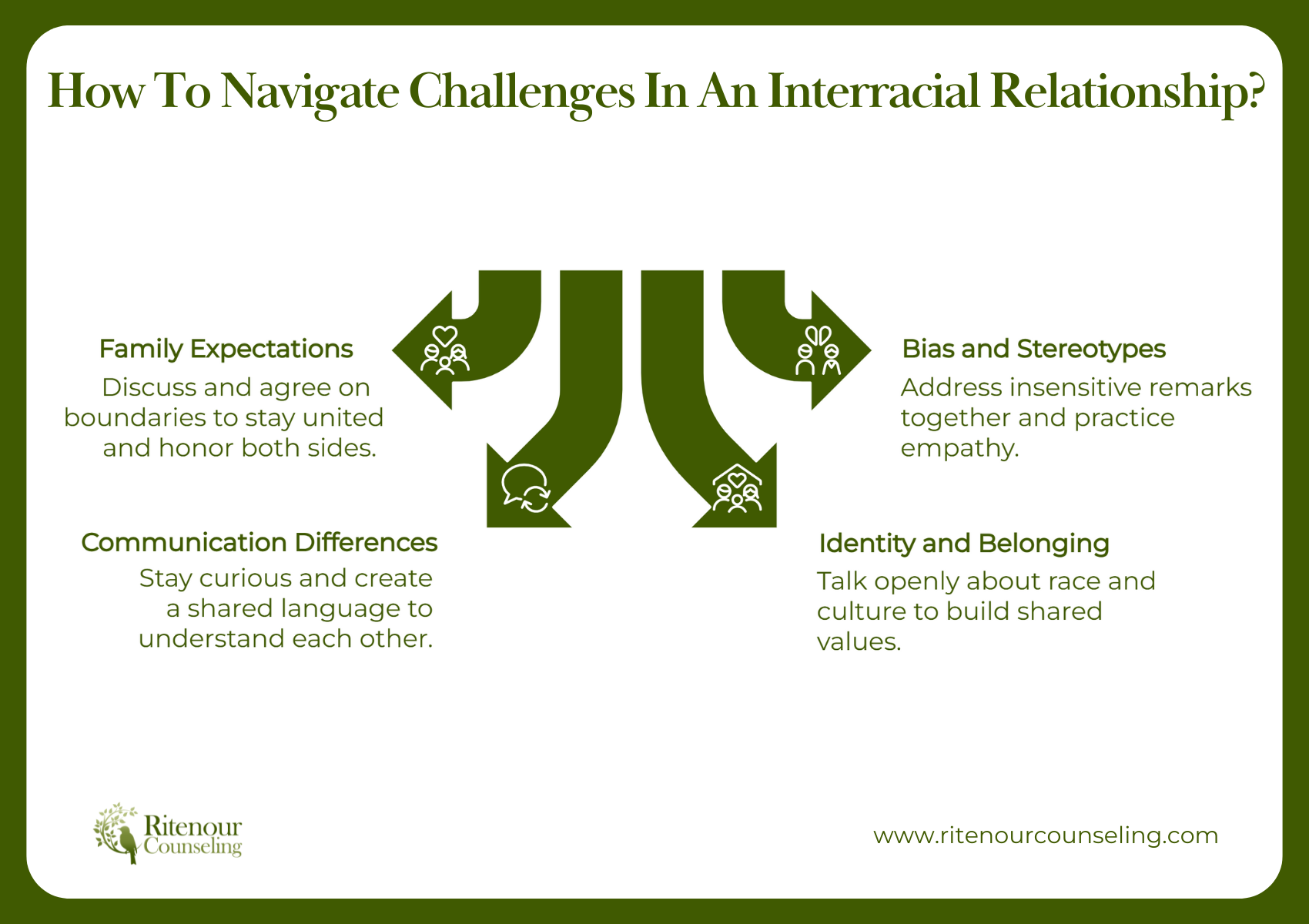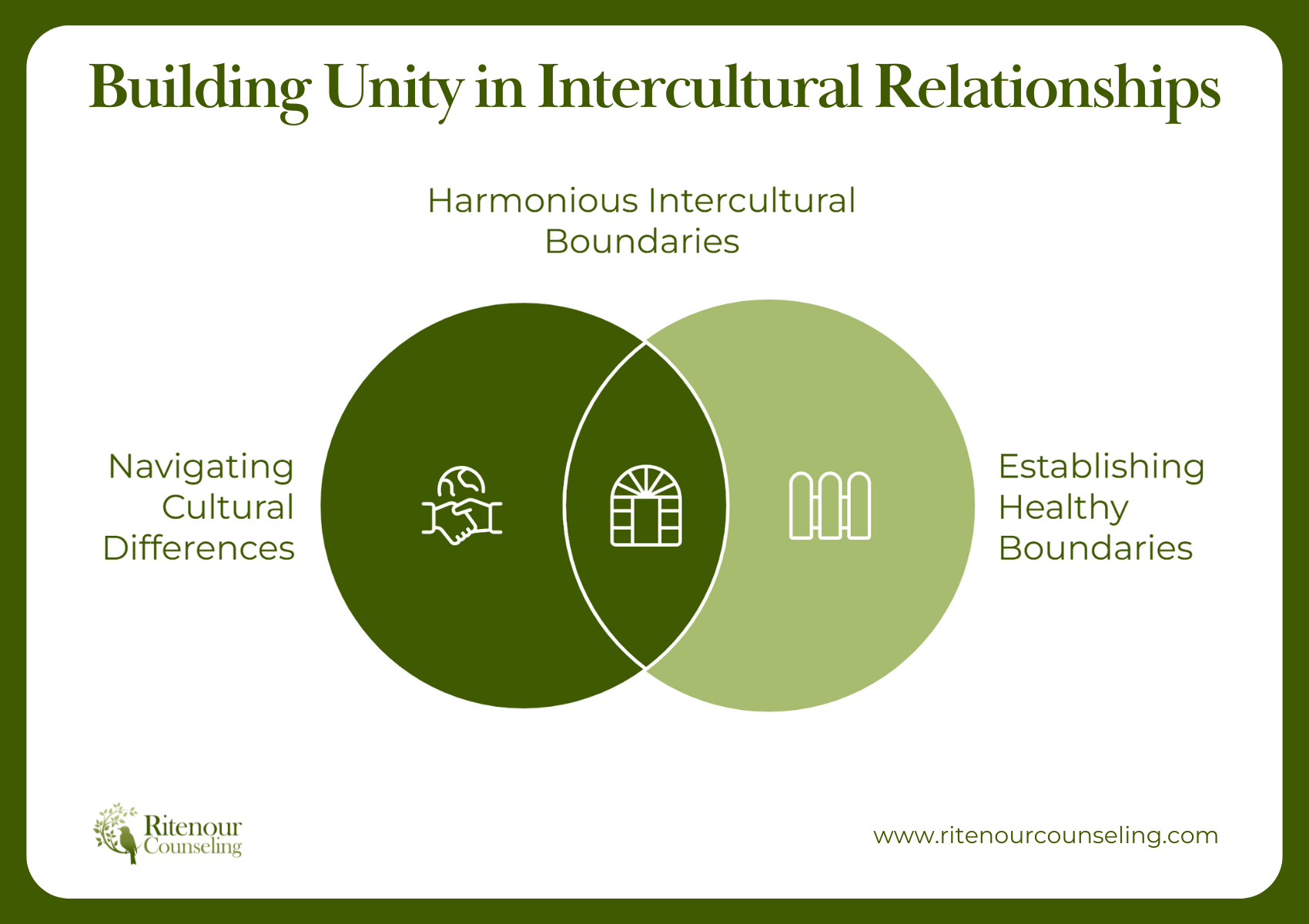Interracial Couples and the Beautiful Work of Understanding Each Other
Love has this incredible way of bringing people together, even when they come from completely different worlds. When you’re part of an interracial couple, you know this firsthand. The beauty of your interracial relationship lies in the way you and your partner learn, grow, and build something real through your shared experiences.
Every romantic relationship takes effort, but interracial couples may face unique layers that go deeper, like navigating cultural differences, society’s expectations, or a lack of support from friends and family. And yet, that’s where the magic happens: in learning to understand each other’s hearts with open-mindedness, curiosity, and love.
In this article, we’ll explore:
What it means to be an interracial couple in the U.S. today
Common challenges interracial couples face and how to move through them together
How interracial couples counseling helps you strengthen your connection
If you’re interested in learning how to create a healthy, successful relationship built on love and respect, you’re in the right place.
What Is an Interracial Couple?
Let’s start simple: an interracial couple is two people from different racial or ethnic backgrounds who choose to build a life together. But it’s so much more than that, isn’t it?
Being in an interracial relationship means you’re blending not only your hearts but also:
Cultures and traditions – the foods, languages, and family rituals that shape you both.
Family expectations – how your loved ones might view interracial dating or interracial marriage.
Communication styles – maybe one of you grew up in a home where feelings were openly discussed, and the other where emotions stayed private.
Societal attitudes – the prejudice or misunderstanding that interracial couples may still encounter today.
According to the Pew Research Center, 17% of newlyweds in the U.S. married someone of a different race or ethnicity, proof that interracial partnerships are becoming more common and more accepted.
But while love across cultures is beautiful, it’s not always easy. You might:
Feel torn between your partner’s world and your own.
Face disapproval or negative reactions from extended family or friends.
Bump into cultural differences or racialized assumptions that feel hurtful or insensitive.
And yet, here’s the hopeful part: these very differences can become the doorway to deeper understanding and connection. Every interracial partnership is unique. There’s no “right way” to love across color, culture, or background, only your way, together.
When interracial couples face unique challenges, curiosity, empathy, and a willingness to learn from each other make all the difference. Because when love is rooted in respect and open-mindedness, it becomes a bridge, not a barrier.
What types of couples therapy are used online?
According to the Pew Research Center, about 17% of newlyweds in the U.S. marry someone of a different race or ethnicity, and that number continues to rise.
Interracial Couples in the U.S.: A Growing Story of Love and Change
If you’re in an interracial relationship in the U.S., you already know: it’s a mix of beauty, learning, and sometimes, a few unexpected challenges. The world around us has changed a lot, and thankfully, love across cultures is more visible and celebrated than ever before.
About 1 in 10 married-couple households nationwide are interracial or interethnic (U.S. Census Bureau, 2023). Just a few generations ago, interracial marriage was still illegal in parts of the U.S.—that’s how much things have shifted.
Attitudes toward interracial marriage have shifted dramatically. In 2021, 94% of U.S. adults said they approved of marriages between Black and White people, the highest level ever recorded by Gallup. For same-sex married couples, around 31% were interracial, significantly higher than among opposite-sex married couples.
We’ ve got social media, travel, and a more global mindset to thank for helping normalize intercultural love. Seeing black men and white women, asian-white couples, or hispanic-white couples together is now just a reflection of modern, multiracial love stories.
But let’s be real, interracial couples experience challenges that can be really difficult, too. You might notice:
Insensitive or discriminatory comments from strangers or extended family.
Pressure on a minority partner to adapt to whiteness or society’s comfort zone.
Misunderstandings rooted in different cultural norms or racialized experiences.
These moments can feel hurtful, but they also illuminate something powerful: the chance to grow together. Every interracial partnership that chooses empathy, emotional support, and curiosity over fear helps shape a more loving, inclusive world.
So if you’ve started dating or married someone interracially, know this: your love story isn’t just yours; it’s part of a growing movement toward connection, courage, and change.
Interracial Couples Challenges: The Hard, but Worthwhile, Conversations
Let’s be honest, interracial couples face unique challenges, and it’s not because love isn’t strong enough. It’s because the world still holds onto old patterns, expectations, and biases that can sneak into even the healthiest interracial romantic relationships. But working through these moments together? That’s what builds real trust, depth, and marital quality.
1. Navigating Family and Cultural Expectations
When you date someone or marry a partner in an interracial union, it can feel like you’re living between two worlds. Maybe one partner’s family traditions are warm and expressive, while the other’s are reserved and formal. Sometimes, one white partner or minority partner may feel pressure to “fit in” or defend their relationship to the extended family.
A few tips that help:
Stay united. You’re a team, not two sides. Talk through what each family expects and agree on boundaries.
Keep your voice. It’s okay to lovingly educate family without losing your calm.
Honor both sides. Blend rituals, foods, or holidays—it’s a small act that says, “We both belong here.”
2. Dealing with Bias, Stereotypes, or Microaggressions
Even with more acceptance, interracial couples may still face racially insensitive remarks or assumptions. Research shows that black women who date or marry white men sometimes experience social backlash, especially within their own communities.
When bias shows up:
Name it together. “That comment hurt. Let’s talk about it.”
Practice validation. A simple “I see how that affected you” goes a long way.
Lean on empathy. The goal isn’t to fight the world; it’s to strengthen your connection against it.
What is the most common interracial couple?
The most common interracial pairing in the U.S. is White-Hispanic couples, followed by White-Asian and White-Black marriages.
3. Communication Differences Rooted in Culture
Sometimes what looks like a personality clash is really cultural wiring. One of you might have grown up in a family that avoided conflict, while the other learned to hash things out directly. That doesn’t mean one is “wrong.” It’s just different racial socialization and family modeling at play.
Try this:
Stay curious, not defensive. Ask, “How did your family talk about hard things?”
Create a shared language. Talk about tone, timing, and emotional needs.
Remember: communication isn’t universal; it’s learned.
4. Identity and Belonging
Being in an interracial partnership can bring up deep questions about identity, especially when you’re raising biracial kids or living in communities that are still mostly monoracial. Studies show that white-minority couples may struggle with belonging more in homogeneous areas.
You can build belonging by:
Talking openly about race and culture with compassion and respect.
Creating shared values that feel authentic to both of you.
Modeling acceptance for future generations.
Every interracial marriage or partnership faces challenges together, but those very conversations, the uncomfortable, honest ones, are what make a healthy relationship thrive. Love that listens, learns, and adapts doesn’t just survive across difference; it transforms it.
What are the struggles of interracial couples?
Even in today’s world, interracial couples can face challenges like:
- Family or cultural misunderstandings
- Stereotypes and microaggressions
- Communication differences shaped by culture
- Feeling “caught between worlds”
How Interracial Couples Counseling Can Help You Feel Seen, Heard, and Understood
Here’s the truth: being in an interracial relationship can be beautiful, eye-opening, and deeply rewarding. But it can also come with layers that same-race couples may never have to think about. From navigating cultural differences to handling society’s attitudes towards minority groups, interracial couples often carry emotional weight that isn’t just “about the relationship.” It’s also about the world you live in.
That’s where interracial couples counseling comes in. It’s not about “fixing what’s broken.” It’s about creating a space where you and your partner can safely unpack the stories, habits, and emotions that shape your bond.
Research shows that interracial couples sometimes experience higher stress levels and lower social support compared to monoracial couples. When that pressure goes unspoken, it can quietly impact marital quality and even raise the rate of divorce. Counseling helps couples recognize those patterns early, before disconnection sets in.
Therapists trained in Emotionally Focused Therapy (EFT) help you notice the emotional cycles that keep you stuck and teach you how to reach for each other differently. It’s about helping both partners feel safe, seen, and understood.
In sessions, interracial couples might work on:
Communicating through cultural differences without judgment or defensiveness.
Rebuilding safety after conflict, especially when misunderstandings feel racially charged.
Setting healthy boundaries with family, especially if one partner feels pressure to conform.
Finding shared meaning across traditions, creating rituals that reflect both of your identities.
At its core, therapy helps love get more honest, not more complicated. When couples feel emotionally connected, they don’t just survive challenges; they thrive through them, building a relationship that feels stronger, safer, and truly theirs.
What are the divorce rates for interracial couples?
Divorce rates vary across groups, but research shows that some interracial marriages, like White-Black or White-Asian pairings, have slightly higher divorce rates than same-race couples, often due to external stress or lack of social support.
Let’s Talk About What’s Getting in the Way of Love
At Ritenour Counseling, we know that every couple, no matter your story or background, deserves a space where love feels safe, seen, and supported. We’re a team of down-to-earth couples experts who specialize in Emotionally Focused Therapy (EFT) because we’ve seen how it transforms connection from the inside out.
Our work isn’t about analyzing or judging. It’s about helping couples slow down, understand what’s really happening beneath the surface, and reconnect in a way that lasts. Whether you’ve dated outside your culture, come from different backgrounds, or are figuring out what it means to be lifelong partners, we’re here to help.
Here’s what you can expect:
No jargon, no judgment; just real conversation.
Support for interracial and multicultural couples.
Practical tools to navigate challenges, communication, and gender roles with empathy.
Your relationship doesn’t need to be perfect; it just needs a little care.
💛 Reach out today and let’s help your love grow deeper, stronger, and more connected.



